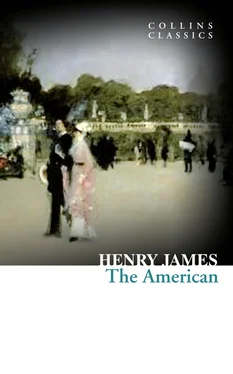“Are you the young lady’s father?” said Newman. “I think she said you speak English.”
“Speak English—yes,” said the old man slowly rubbing his hands. “I will bring it in a cab.”
“Say something, then,” cried his daughter. “Thank him a little—not too much.”
“A little, my daughter, a little?” said M. Nioche perplexed. “How much?”
“Two thousand!” said Mademoiselle Noemie. “Don’t make a fuss or he’ll take back his word.”
“Two thousand!” cried the old man, and he began to fumble for his snuff-box. He looked at Newman from head to foot; he looked at his daughter and then at the picture. “Take care you don’t spoil it!” he cried almost sublimely.
“We must go home,” said Mademoiselle Noemie. “This is a good day’s work. Take care how you carry it!” And she began to put up her utensils.
“How can I thank you?” said M. Nioche. “My English does not suffice.”
“I wish I spoke French as well,” said Newman, good-naturedly. “Your daughter is very clever.”
“Oh, sir!” and M. Nioche looked over his spectacles with tearful eyes and nodded several times with a world of sadness. “She has had an education—tres-superieure! Nothing was spared. Lessons in pastel at ten francs the lesson, lessons in oil at twelve francs. I didn’t look at the francs then. She’s an artiste, ah!”
“Do I understand you to say that you have had reverses?” asked Newman.
“Reverses? Oh, sir, misfortunes—terrible.”
“Unsuccessful in business, eh?”
“Very unsuccessful, sir.”
“Oh, never fear, you’ll get on your legs again,” said Newman cheerily.
The old man drooped his head on one side and looked at him with an expression of pain, as if this were an unfeeling jest.
“What does he say?” demanded Mademoiselle Noemie.
M. Nioche took a pinch of snuff. “He says I will make my fortune again.”
“Perhaps he will help you. And what else?”
“He says thou art very clever.”
“It is very possible. You believe it yourself, my father?”
“Believe it, my daughter? With this evidence!” And the old man turned afresh, with a staring, wondering homage, to the audacious daub on the easel.
“Ask him, then, if he would not like to learn French.”
“To learn French?”
“To take lessons.”
“To take lessons, my daughter? From thee?”
“From you!”
“From me, my child? How should I give lessons?”
“Pas de raisons! Ask him immediately!” said Mademoiselle Noemie, with soft brevity.
M. Nioche stood aghast, but under his daughter’s eye he collected his wits, and, doing his best to assume an agreeable smile, he executed her commands. “Would it please you to receive instruction in our beautiful language?” he inquired, with an appealing quaver.
“To study French?” asked Newman, staring.
M. Nioche pressed his finger-tips together and slowly raised his shoulders. “A little conversation!”
“Conversation—that’s it!” murmured Mademoiselle Noemie, who had caught the word. “The conversation of the best society.”
“Our French conversation is famous, you know,” M. Nioche ventured to continue. “It’s a great talent.”
“But isn’t it awfully difficult?” asked Newman, very simply.
“Not to a man of esprit, like monsieur, an admirer of beauty in every form!” and M. Nioche cast a significant glance at his daughter’s Madonna.
“I can’t fancy myself chattering French!” said Newman with a laugh. “And yet, I suppose that the more a man knows the better.”
“Monsieur expresses that very happily. Helas, oui!”
“I suppose it would help me a great deal, knocking about Paris, to know the language.”
“Ah, there are so many things monsieur must want to say: difficult things!”
“Everything I want to say is difficult. But you give lessons?”
Poor M. Nioche was embarrassed; he smiled more appealingly. “I am not a regular professor,” he admitted. “I can’t nevertheless tell him that I’m a professor,” he said to his daughter.
“Tell him it’s a very exceptional chance,” answered Mademoiselle Noemie; “an homme du monde—one gentleman conversing with another! Remember what you are—what you have been!”
“A teacher of languages in neither case! Much more formerly and much less to-day! And if he asks the price of the lessons?”
“He won’t ask it,” said Mademoiselle Noemie.
“What he pleases, I may say?”
“Never! That’s bad style.”
“If he asks, then?”
Mademoiselle Noemie had put on her bonnet and was tying the ribbons. She smoothed them out, with her soft little chin thrust forward. “Ten francs,” she said quickly.
“Oh, my daughter! I shall never dare.”
“Don’t dare, then! He won’t ask till the end of the lessons, and then I will make out the bill.”
M. Nioche turned to the confiding foreigner again, and stood rubbing his hands, with an air of seeming to plead guilty which was not intenser only because it was habitually so striking. It never occurred to Newman to ask him for a guarantee of his skill in imparting instruction; he supposed of course M. Nioche knew his own language, and his appealing forlornness was quite the perfection of what the American, for vague reasons, had always associated with all elderly foreigners of the lesson-giving class. Newman had never reflected upon philological processes. His chief impression with regard to ascertaining those mysterious correlatives of his familiar English vocables which were current in this extraordinary city of Paris was, that it was simply a matter of a good deal of unwonted and rather ridiculous muscular effort on his own part. “How did you learn English?” he asked of the old man.
“When I was young, before my miseries. Oh, I was wide awake, then. My father was a great commercant; he placed me for a year in a counting-house in England. Some of it stuck to me; but I have forgotten!”
“How much French can I learn in a month?”
“What does he say?” asked Mademoiselle Noemie.
M. Nioche explained.
“He will speak like an angel!” said his daughter.
But the native integrity which had been vainly exerted to secure M. Nioche’s commercial prosperity flickered up again. “Dame, monsieur!” he answered. “All I can teach you!” And then, recovering himself at a sign from his daughter, “I will wait upon you at your hotel.”
“Oh yes, I should like to learn French,” Newman went on, with democratic confidingness. “Hang me if I should ever have thought of it! I took for granted it was impossible. But if you learned my language, why shouldn’t I learn yours?” and his frank, friendly laugh drew the sting from the jest. “Only, if we are going to converse, you know, you must think of something cheerful to converse about.”
“You are very good, sir; I am overcome!” said M. Nioche, throwing out his hands. “But you have cheerfulness and happiness for two!”
“Oh no,” said Newman more seriously. “You must be bright and lively; that’s part of the bargain.”
M. Nioche bowed, with his hand on his heart. “Very well, sir; you have already made me lively.”
“Come and bring me my picture then; I will pay you for it, and we will talk about that. That will be a cheerful subject!”
Mademoiselle Noemie had collected her accessories, and she gave the precious Madonna in charge to her father, who retreated backwards out of sight, holding it at arm’s-length and reiterating his obeisance. The young lady gathered her shawl about her like a perfect Parisienne, and it was with the smile of a Parisienne that she took leave of her patron.
Читать дальше












